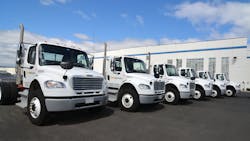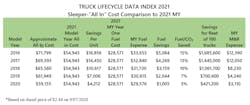This is somewhat of a variation on my recent blog in which I talked about why sitting on the sidelines when it comes to electric trucks is not necessarily a good idea. But this time I want to talk more broadly about asset replacement in general.
What sparked the need to talk about this was the release of the latest Truck Lifecycle Data Index from Fleet Advantage. The index compares what the company calls “the all-in operating costs of older model Class 8 trucks to 2021 model-year replacements.”
The index shows that fleet operators can see a first-year per-truck savings of $16,856 when upgrading from a 2016 sleeper model-year truck to a 2021 model year truck. The company says for a fleet of 100 trucks that savings can reach $1.7 million.
The improved fuel economy of newer trucks — even when fuel prices are low — are a big reason why keeping your fleet updated makes sense. But there also are likely to be safety improvements and CO2 reductions as well.
Fleets can save $5,084 per truck in fuel in the first year following replacement of a 2016 MY sleeper, a 15% increase in fuel economy and a reduction of CO2 emissions.
Look, I am not suggesting you go out and replace every one of your assets at once. What I am saying is that you should establish a consistent asset replacement cadence and stick with it. Sure, it can be OK to extend a lease for a few months if conditions warrant, but don’t skip an entire replacement cycle thinking you are going to save money.
The reality is that operating costs of older assets can be significantly higher than those of newer assets. Older assets likely will need more maintenance and as truck makers continue to evolve diesel engine technology as well as other fuel-saving add on technologies like aerodynamic devices, idle reduction systems, etc., newer assets will be inherently more fuel efficient.
The Fleet Advantage index is solid proof that fleets will reap fuel savings and see carbon emissions reductions when replacing older trucks with newer models. The end result is not only cost savings for the fleet but a clean environment for all of us.
This is another time when sitting on the sidelines might not be your best choice.
________________________
Michael Roeth has worked in the commercial vehicle industry for nearly 30 years, most recently as executive director of the North American Council for Freight Efficiency. He currently serves on the second National Academy of Sciences Committee on Technologies and Approaches for Reducing the Fuel Consumption of Medium and Heavy-Duty Vehicles and has held various positions in engineering, quality, sales and plant management with Navistar and Behr/Cummins.
About the Author

Michael Roeth
Executive Director
Michael Roeth is the executive director of the North American Council for Freight Efficiency. He serves on the second National Academy of Sciences Committee on Technologies and Approaches for Reducing the Fuel Consumption of Medium and Heavy-Duty Vehicles and has held various positions with Navistar and Behr/Cummins.

